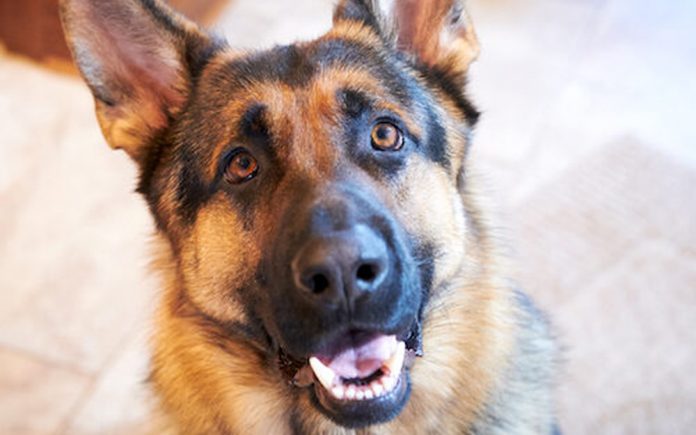
By Janet McAfee
These beautiful, brilliant dogs bravely searched for survivors on 9/11, protected our military by detecting land mines, and lovingly guard their human families. German Shepherds are my favorite breed, full of engaging personality, majestic and devoted. My parents adopted a German Shepherd puppy when I was born, and he later saved my life when I was a baby.
Tragically German Shepherds are now entering crowded public animal shelters in record numbers. In some regions, they are the second largest breed to be euthanized in public shelters after Pit Bulls. What can we do to help save these Shepherds when crowded shelters run out of space? Large size working breed dogs do not do well in kennels. Over time, they can become stressed, shut down, bark at visitors, and become less adoptable.
Several factors created this crisis. Rising housing costs and evictions are the reason many renters relinquish their pets. Many landlords sold their rental homes to profit from the increased value of home prices. Remaining landlords can select 10 applicants with no pets over an applicant with 2 large dogs and 2 cats. Middle aged folks having to move in with senior parents may learn their parents’ offer doesn’t include a resident large active dog.
 Maria Dales, Executive Director of German Shepherd Rescue of Orange County, explains, “We are seeing an unprecedented number of purebred German Shepherds and purebred Belgian Malinois in shelters this year and it’s daunting for rescuers. We attribute this to an increase in backyard breeding during the pandemic, as well as the popularity of a recent movie featuring a Belgian Malinois. We urge public shelter administrators to enforce existing breeding ordinances to reduce the number of litters being born. Public shelters need to waive their owner surrender fees for those losing their homes and unable to afford them. WE CANNOT RESCUE OR ADOPT OUR WAY OUT OF PET OVERPOPULATION.”
Maria Dales, Executive Director of German Shepherd Rescue of Orange County, explains, “We are seeing an unprecedented number of purebred German Shepherds and purebred Belgian Malinois in shelters this year and it’s daunting for rescuers. We attribute this to an increase in backyard breeding during the pandemic, as well as the popularity of a recent movie featuring a Belgian Malinois. We urge public shelter administrators to enforce existing breeding ordinances to reduce the number of litters being born. Public shelters need to waive their owner surrender fees for those losing their homes and unable to afford them. WE CANNOT RESCUE OR ADOPT OUR WAY OUT OF PET OVERPOPULATION.”
During the pandemic, money seeking breeders bred more dogs for homebound people. Those cute Shepherd puppies are now 70-pound active dogs they may be unable to handle. Other adopters returned to work and relinquished their pets. German Shepherds shed a lot, and not everyone has the patience to do frequent brushings. During the pandemic, spaying and neutering was not considered essential, and vet clinics with staff shortages did not always offer this service. More dogs of all breeds were born.
 What can you do to help? Adopt a German Shepherd from a shelter. Those over 3 years of age are usually calm and eager to please when inside your home. Pictured here is Rosie, a 3-year-old at the Coachella Valley Animal Campus (CVAC), our Riverside County shelter in Thousand Palms www.rcdas.org. Her gorgeous face framed in fuzzy fur, Rosie loves people and other big dogs.
What can you do to help? Adopt a German Shepherd from a shelter. Those over 3 years of age are usually calm and eager to please when inside your home. Pictured here is Rosie, a 3-year-old at the Coachella Valley Animal Campus (CVAC), our Riverside County shelter in Thousand Palms www.rcdas.org. Her gorgeous face framed in fuzzy fur, Rosie loves people and other big dogs.
If you cannot adopt, consider becoming a life-saving foster parent. The sponsoring organization covers all costs. To foster for CVAC call their foster supervisor at (951) 358-7376 www.rcdas.org. To foster a big dog for Loving All Animals fill out their volunteer application at www.lovingallanimals.org and call (760)834-7000. Palm Springs residents can contact their shelter at (760) 416-5718 www.psanimals.org.
If you can’t foster or adopt, volunteer at one of the 3 local shelters that have many large dogs. The CVAC Shelter, the Humane Society of the Desert, and the Palm Springs Animal Shelter have many large breeds needing exercise and human contact.
If you are too busy to do any of the above, make a tax-deductible donation to the German Shepherd Rescue of Orange County www.gsroc.org, a private nonprofit that also rescues Shepherds from Riverside County. Donate to one of the private local animal organizations on the attached list.
If you can’t afford to donate, network homeless animals on social media. LIKE the Facebook page for the Coachella Valley Animal Shelter and others and then SHARE their animals. HELP SAVE A GERMAN SHEPHERD TODAY!











































